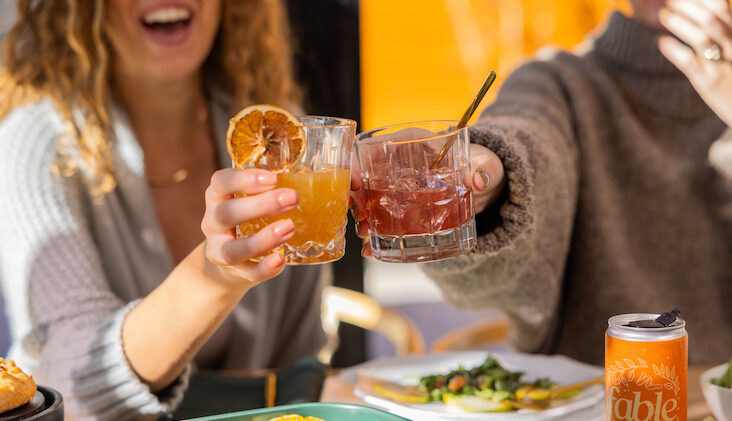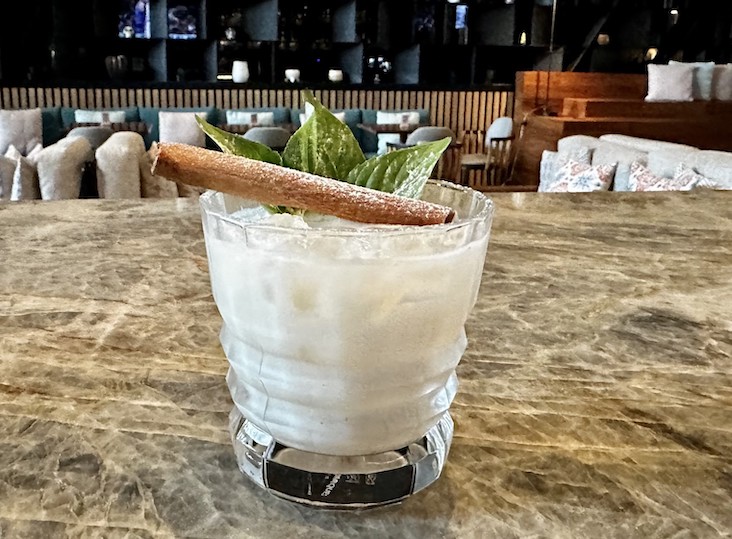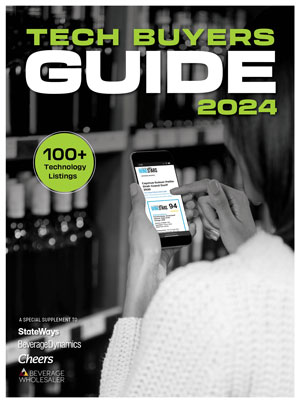The cannabis and CBD beverage industry has grown rapidly in recent years, driven by increasing legalization, consumer interest in wellness alternatives and the desire for new ways to experience relaxation and socialization.
According to Grand View Research, the global cannabis beverage market was valued at $1.16 billion in 2023 and is projected to grow at a CAGR of 19.2% from 2024 to 2030. The North American market dominates this space due to widespread legalization, particularly in the U.S. and Canada.
In the U.S. alone, the cannabis-infused beverage market is projected to hit $1.4 billion by 2025, according to BDS Analytics and Arcview Market Research. This is being fueled by recreational legalization in multiple states and increased consumer demand for alternatives to alcohol.
“The cannabis and hemp beverage industry is expanding at a significant pace, reflecting both consumer interest and legal developments,” says Kelly Ravestijn, senior vice president, commerce intelligence at Advantage Unified Commerce, Advantage Solutions.
According to Ravestijn, this growth is fueled by “product innovation, evolving consumer preferences and the strategic use of social media and direct-to-consumer (DTC) channels.”
Cannabis benefitting from the zero proof movement
Just 10 years ago, cannabis and CBD-infused beverages were not how they are today. The taste wasn’t very good, the dosage was off and they weren’t as widely available as they are now.
As manufacturers continue to enhance cannabis beverages with improved flavor profiles, functional ingredients like adaptogens and precise dosing, they appeal to “health-conscious and sober-curious consumers looking for alternatives to alcohol or those simply preferring the buzz of cannabis,” according to Ravestijn.
The growing “zero proof” movement has caused health-conscious consumers to move away from alcohol beverages.
“This shift is primarily driven by younger consumers (Gen Z and Millennials), who perceive alcohol, even in small quantities, as unhealthy,” says Mayra Medina, founder of Oui’d Marketing. “Cannabis drinks are seen as a healthier alternative for social consumption, allowing users to still engage in social settings without the negative effects, such as hangovers.”
Many canned cocktail and beer brands have also noticed this trend, and tried to hop on the bandwagon by offering beverages with a lower ABV content.
An example of this can be seen when Tattersall Distilling launched a new canned cocktail line just last year that was reformulated to have less sugar, fewer calories and a lower ABV of 4.5%. Two Roads Brewing also launched a hard seltzer line a few years ago, with each flavor featuring an ABV of 4.5% and coming in around 100 calories.
“The trend is very clear: consumers want to stay hydrated and they’re moving away from high amounts of alcohol,” notes Cornbread Hemp’s co-founder and CCO Jim Higdon. “There’s the NA beer and mocktail markets, and even zero proof alcohol. There’s so much growth in the alcohol-free and hemp/THC beverage space.”
Making its way downtown
Aside from the increasing zero proof movement, cannabis consumption has also become more widely acceptable.
For many years, people limited their use to small, private circles. “Today, cannabis is more acceptable than ever, with nearly half of the nation’s states offering medical or recreational programs,” explains Oui’d Marketing’s Medina. “This accessibility has led to more open consumption and less stigmatization of cannabis users.”
The same can be said for the hemp market, with brands able to sell and ship products nationwide. “Some brands are even carried in national retail chains, building greater consumer trust in the products they purchase,” Medina says.
In states that have legalized recreational marijuana across the country, a variety of cannabis and hemp-infused beverages can be seen on store and restaurant shelves.
Cultivating Spirits, for example, offers a private dinner party for consumers, featuring a custom-crafted three-course meal paired with craft cannabis by a cannabis sommelier. With locations in California, Colorado and Nevada, guests are allowed to consume cannabis onsite, with strains offered through Cultivating Spirits’ dispensary partner.
Wake N Bakery is Chicago’s first legal cannabis-infused bakery and coffee shop. Making their debut in January of 2020, visitors can drink cannabis-infused coffees, teas and lemonades while trying the cafe’s THC-infused baked goods.
Atlanta-based brewery Scofflaw Brewing recently joined the nascent hemp market through the launch of its latest line of THC-infused beverages in August 2024. Scofflaw’s new infused beverage line can be found at their tap rooms, in stores throughout Georgia and shortly throughout the Southeast.
“As we learn more about everyone’s tastes and preferences in this market, we will continue to release new flavors and potentially new lines to adapt as the space evolves,” says Matt Moore, VP of sales and marketing at Scofflaw Brewing. “Also, as regulations allow, there is opportunity to have different levels of hemp dosage to further differentiate our offerings.”
Even beverage alcohol wholesalers are getting in on the action. Vermont-based cannabis product manufacturer Upstate Elevator Supply recently partnered with Johnson Brothers of Minnesota and local brewer Surly Brewing Co. to introduce a new 10mg THC beverage line across the state.
“We’re excited to introduce our THC beverages to Minnesota, where sensible cannabis regulations set a model for the nation,” says Brooke Raap, COO of Upstate Elevator Supply.
While some states allow businesses to be innovative with how they sell their cannabis products, other states like Connecticut restrict THC beverages to only be sold in liquor stores and dispensaries.
MJBizDaily reported that Connecticut House Bill 5150, signed into law in May 2024, restricts THC-infused beverages to only be sold at state-licensed liquor stores and cannabis retailers. Under the new law, which went into effect July 1, intoxicating hemp products no longer may be sold at gas stations and convenience stores.
Where’s the data?
The consumer demographic for cannabis-infused beverages is wide-ranging and ubiquitous. Similar to alcohol, “almost every demographic is drawn to cannabis in some capacity,” according to Adam Terry, CEO of Cantrip.
“It is inside the specific flavors, beverage types and dosing strengths that you begin to taste out which demographics prefer which products, but the ingredient as a whole has an incredibly broad audience,” he continues. “We are finding that low-dose, low-sugar beverages are more attractive to young professionals, and that mid-dose, flavorful sodas appeal to folks 45+.”
Due to the cannabis industry still being in its early stages, many businesses have struggled to gather market data. But certain brands can accumulate the information they do know: how well their beverages sell and who buys them.
“Our customers seem to be consuming cannabis beverages after 5:30 p.m., and even sometimes after 7:30 p.m.,” says Fable Libations’ CEO Ben Kennedy. By working with a team of chefs, mixologists and food scientists, Fable’s cannabis-infused cannabis drinks have won several awards at the 2024 Wine and Spirits Wholesalers of America Access Live event. They were also featured as the first THC beverage company at the Aspen Food & Wine Classic.
Kennedy hypothesizes that users consume their beverages at night to relax and decompress after a long day.
“In our case, the CBD works with the THC to amplify those relaxed feelings, giving users a great night’s sleep,” he says. “Customers are always giving us feedback on how great our beverages work to help them fall asleep.”
Getting product into stores
Fable’s infused beverages are sold in hotels, bars, restaurants and liquor stores. Because their beverages are infused with delta-9 THC, which is sourced from the hemp plant instead of the marijuana plant, Kennedy says it’s easier to ship and sell his beverages across the country.
Fable isn’t sold in dispensaries, however.
“Fable is available in Total Wine retailers in four or five states where there’s a legal framework to do so,” says Kennedy, “but we would not go back into a dispensary. The product we’ve created just doesn’t live in a dispensary environment. Can we reach those people? Sure. But it’s one in 200 people walking through the door who would buy it.”
Kennedy explains that it can be difficult to get his products into different stores. Even though his product is fully legal under the 2018 Farm Bill, certain states have their own conflictions with the substance.
In fact, a significant number of states, including Alabama, Alaska and Arkansas, maintain strict prohibition on delta-9 THC, according to World Population Review. The evolving legal landscape reflects ongoing debates over the substance’s regulation, with states continually reassessing their positions. Currently, delta-9 THC is legal in 18 states, while it is prohibited in 32 others.
The future of cannabis and CBD beverages
Cantrip’s Terry believes cannabis and CBD-infused beverages will continue to be popular for two simple reasons: They are available, and people like them.
“Now that everyday Americans can access THC drinks where they shop normally, particularly in states where there are no other THC options available, the market will only grow,” he says. “They serve a growing need for an alternative to alcohol that actually provides an effect that people like without some of the more painful repercussions of drinking.”
Cornbread Hemp’s Higdon mentions that there’s always a potential for the market to become too saturated, “but we continue to see significant growth for the category. Until the market has settled, there’s a lot of room for growth.”









